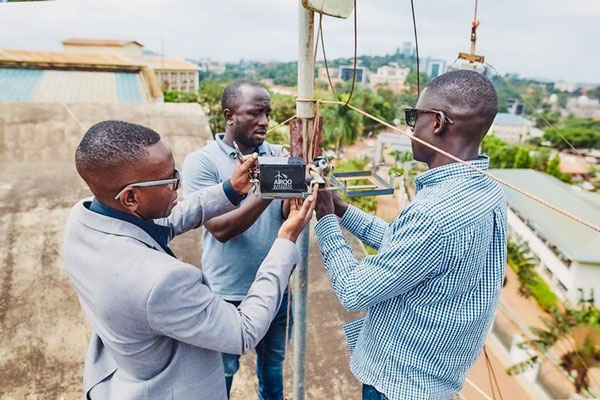
A team of engineering and computer science students at Makerere University in Uganda has developed a low-cost air quality monitoring system now being used to combat air pollution across eight countries
SPECIAL REPORT | BIRD AGENCY | A technology developed by a group of tech-savvy engineering and computer science students led by a computer science professor at Uganda’s Makerere University is helping cities with a major problem: accessing equipment to monitor air quality.
According to Engineer Bainomugisha, an Associate Professor of Computer Science at Makerere University and AirQo lead founder, countries in Sub-Saharan Africa “lack capacity to collect any useable data on air quality due to the prohibitive cost of air monitoring systems.”
Enter the team from Makerere. The students have developed a low-cost air quality monitor dubbed AirQo that collects information about air pollution levels, types of air pollutants, and air quality, which offers an alternative to prohibitively expensive imported equipment.
“Without data, we cannot establish the extent and effect of air pollution in our cities, and thus it becomes hard to address the problem, and this was the major motivation behind the low-cost air quality sensors being produced at Makerere University,” said Bainomugisha.
AirQo, the company that now manufactures the AirQo air monitors, was founded in 2015 at Makerere University, but the production of the monitors began in 2019.
Bainomugisha says the air quality monitoring tool is helping to enhance clean air for African cities by collecting, analysing, and forecasting air quality data to international standards.
“Our aim is to close the gaps identified in air quality monitoring across Africa. The low-cost air quality monitors are specifically designed for the African problem to suit the African infrastructure and provide affordable locally led solutions to African air pollution challenges,” explained Bainomugisha.
“The air quality monitors manufactured at Makerere provide accurate, hyperlocal, and timely data that puts bare the magnitude and scale of air pollution in African cities,” he added.
In Uganda, AirQo has deployed over 187 air quality monitors in 80 locations in Kampala, Gulu, Jinja, and Fort Portal. In Kenya, the Makerere-made Air 28 quality monitors are in use in Nairobi and Kisumu cities.
For cities like Kampala and Nairobi, the data collected by AirQo monitors help authorities develop policies, strategies, and legislation to control air pollution and mitigate its effects amid the increase in the city’s population.
Bainomugisha explained that AirQo air quality monitoring devices collect air samples, which are then analysed through a light scattering technology that quantifies the particulate matter’s concentration.
The information is then relayed to a cloud-based AirQo network that determines the pollution levels in a specific area. AirQo devices measure the air particulate matter PM2.5 and PM10, a mixture of solid particles in the air and the most common pollutants in African cities. The monitors also measure ambient meteorological conditions such as humidity and atmospheric pressure.
To enhance their durability, AirQ0 air quality monitors are designed to withstand the effects of extreme environmental conditions such as dust and severe weather.
Gideon Lubisia, AirQo’s international operations embedded systems and network support engineer, observed that the air monitors run on a 2G GSM-enabled network configuration for loT sim cards and are optimised to work in areas with unstable internet and power connectivity.
“AirQo has also developed the AirQo mobile App that allows people to receive periodic and timely updates on the air quality within their city. The easy-to-use app is free to download,” Lubisia noted.
“With the mobile app, you will receive notifications on the quality of the air you are breathing in your city and whether it’s safe or not,” he added.
Lubisia explained that the AirQo monitor can be placed strategically within the city or mounted on mobile motorised devices like motorbikes.
“When the monitors are mounted on motorbikes, for instance, it improves the spatial coverage and resolution and can enable the collection of air data from multiple locations within one city,” observed Lubisia.
Nairobi City County, Deputy Director in charge of Air Quality and Climate Maurice Kavai said that through the partnership, Nairobi City has developed two air quality collocation installations using AirQo low-cost sensors and infrastructure reference grade monitors in Nairobi.
“Through the one-stop center collocations, our research teams can compare air quality data collected from various points within the city, which is key in developing appropriate action,” Kivai explained.
The Nairobi Air Quality Act is a piece of legislation passed by the county assembly of Nairobi after being developed by a team from the county government and Kenyan researchers under the Kenya Air Quality Network after developing an evidence-based air pollution management plan from the data collected through the AirQo monitors.
Kavai agrees that air pollution data is key to solving the air pollution problem.
“With the availability of periodic data collected by the monitors, now we can establish the extent of pollution in particular areas, the causes and develop necessary actions,” he said.
According to Paul Njogu, Nairobi Air Research and Data Committee Chair, the technology is helping the city make notable progress in managing Kenya’s ambient air pollution.
AirQo monitors are now in use within select cities in eight African countries, including Uganda, Kenya, Nigeria, Cameroon, Burundi, Ghana, Mozambique, and Senegal, with 160 monitors installed across African cities.
In 2019, AirQo won the Google AI Impact challenge that came with a US$1.3 million cash prize, while the AirQo mobile App won the 2020 World Meteorological Organization Weather Award.
*****
SOURCE; By Jackson Okata, bird story agency
 The Independent Uganda: You get the Truth we Pay the Price
The Independent Uganda: You get the Truth we Pay the Price


